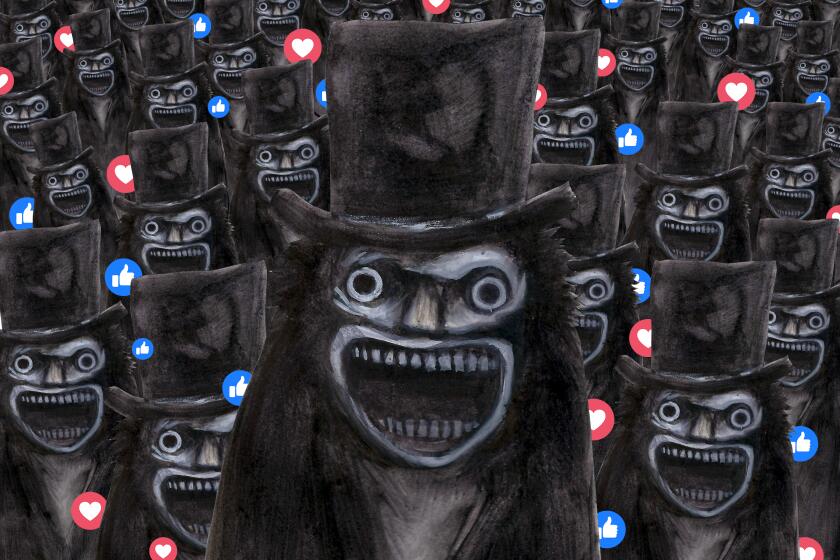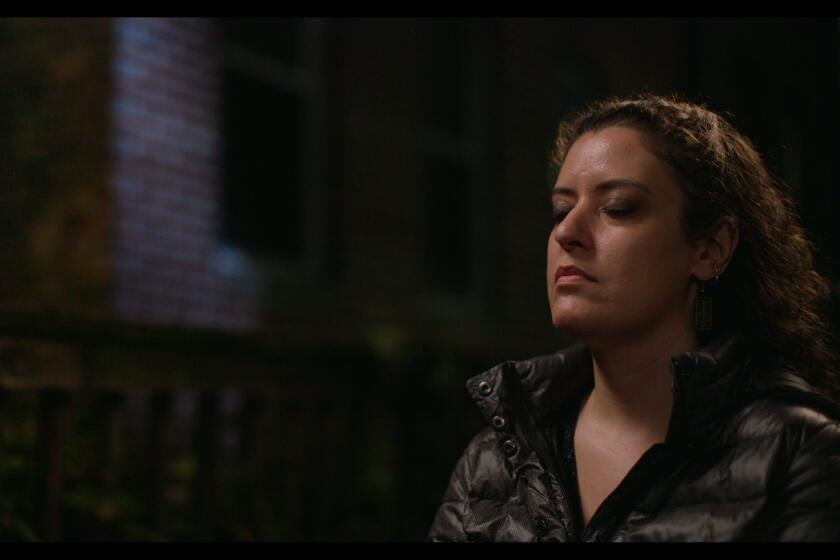Almagor Exorcises Her Ghosts in ‘Aviya’
Most of her life, Gila Almagor, Israel’s leading actress, had lived with a dark secret--a secret now brought to light in the largely autobiographical film “The Summer of Aviya.”
The film, which centers on a child’s traumatic loss of her war-scarred mother to madness, has won the Silver Menorah, Israel’s highest film award. Almagor and the film’s director, Eli Cohen, also received the award.
“The Summer of Aviya” is the Israeli entry for best foreign film in the Academy Awards, and is scheduled to open in Los Angeles this spring. The $400,000 feature, shot in 30 frantic days, has been a critical and a box-office success--with Israeli audiences leaving theaters red-eyed.
For 32 years, some critics say, Almagor has been the Katharine Hepburn and Meryl Streep of the Hebrew-speaking stage and screen. Exhibiting a seemingly boundless emotional range in hundreds of roles--from Anne Frank and Joan of Arc to a prostitute--she has admirers from three generations, and her shelves are filled with Israel’s highest acting awards.
Two years ago, Almagor suffered a breakdown that opened the wounds of her childhood.
“For five days, I couldn’t stop crying. I stole a notebook from my daughter’s drawer and began writing--it stopped me from going out of my mind. It was the worst period of my life. The only way I could stop crying was by writing out my innermost thoughts.”
She hid her notebook from her husband and teen-age daughter.
As she poured her emotions onto the pages, out came a traumatic tangle of childhood memories. Her widowed mother, “the madwoman” of the village, was prone to rages and frequent institutionalizations.
When her mother was sent to one of the institutions, Almagor was sent to the Children’s Village, established after World War II for “orphans of the disaster.” “It was a beautiful place with healthy-looking children,” Almagor said. “But at night, children were moaning in their beds, crying in the corridors and reliving the death camps.”
She left the village at 15 to join the prestigious Habimah Theater School.
It took Almagor 10 days to put the words on paper, an experience she likens to a cerebral catharsis. “Here I was almost 50, yet no one knew who I was, not even my husband,” she said. When she eventually read to her husband from the notebook, he was moved to tears and urged her to show it to a friend at Israel’s largest publishing house.
The scribbled notes were rushed into print. Five months later, the largely autobiographical “Summer of Aviya” was a best seller.
Almagor hit a national nerve. Letters flooded in--from survivors, the mentally ill and children. Teachers are requiring students as young as 10 to read the book.
Almagor adapted her book into a one-woman play and for most of the last 14 months has been performing it three times a week, taking one month last Spring to bring her story to the screen. There have been more than 400 performances, all sold out.
“Aviya” is about the turbulent months of 1951 when her mother, newly released from a mental institution, drags her from the Children’s Village to their wooden shack in Petach Tikvah. The mother, with blue numbers tattooed on her arm, shaves her daughter’s head to rid it of imaginary lice. The once-beautiful Polish partisan struggles to make a life for herself and her daughter amid villagers who ridicule them. She irons, washes and mends clothes, but her own life is beyond repair.
This was the last summer she spent out of an institution.
Almagor, who co-wrote and co-produced the film version, portrays her mother, a role that she wrote for herself.
But finding an Israeli girl to play Aviya, the young Gila Almagor, was a daunting task. After running ads in newspapers and after months of auditioning 1,800 girls all over the country, Almagor and director Cohen realized they were in trouble.
Then on the last day of auditions, a miracle occurred in the form of a 9-year-old girl: “She was not only perfect,” Almagor said, “it turned out she lived right under our noses, in the building next to our production office.”
Kaipo Cohen, the daughter of a divorced Syrian father and a German immigrant mother, gives a riveting performance as Aviya.
The child notices a compassionate neighbor acting kindly to her mother, and because he resembles the man in the tattered photos that she has taken from her mother, she becomes convinced that he is the father she never knew. The girl imagines him joining her and her mother to form a family.
Almagor still carries photos of her father. “I take them wherever I go,” she said, drawing them from her purse. “As a child I so longed for a father. For months, I was convinced our neighbor was the father I yearned for. I hoped he’d leave his screaming wife and ugly, awful daughter and come live with my mother and me.”
Her mother never talked about the father, who died five months before Almagor’s birth. “All she ever told me is that he had a beautiful voice. I’ll be 50 in July and that’s all I’ll ever know.”
Her mother considered naming her Aviya, which means “her father,” but opted instead for Gila, which means “happiness.”
Bringing the painful memories to the screen took courage. “The film’s over, but I’m still haunted by it,” Almagor said. Her generation of Israelis grew up trying to ignore the Shoah, or the Holocaust. “My friends who were in the camps as children still can’t talk about it, and some of them are becoming grandparents. But now many of the survivors are old and dying with their secrets.”
In “Summer of Aviya” she remembered neighbors such as the the camp survivor who lived in a deserted bus. “He never spoke to anyone, and then one day he committed suicide. I was too young to understand then. The horrors he’d had were unspeakable.”
A cousin who was mute after leaving the Auschwitz death camp is a character in the film. “He lived with us, but couldn’t speak,” Almagor said, adding that the man was able to sing. “He and my mother used to sit and sing the same song for hours.” She put that scene in the movie, and has been contacted by Auschwitz survivors asking for the words to the song they used to sing in the death camp.
More to Read
Only good movies
Get the Indie Focus newsletter, Mark Olsen's weekly guide to the world of cinema.
You may occasionally receive promotional content from the Los Angeles Times.






